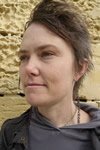SU Humanities Faculty Fellow discusses health activism in L.A. during 1960s, '70s
Jenna Loyd to examine health politics in context of city's then-growing defense economy

The Syracuse University Humanities Center, housed in The College of Arts and Sciences, will kick off its 2013 Faculty Fellow Lecture Series with a program on health activism. Jenna Loyd, a faculty fellow in SU’s geography and anthropology departments, will discuss “Freedom’s Body: The Militarized Grounds of People’s Health Activism in Los Angeles” on Tuesday, March 5, at 4 p.m. in the Tolley Humanities Building (room 304). The program includes a response from Robin Riley, assistant professor of women’s and gender studies.
The event is free and open to the public. For more information, contact Karen Ortega, HC program coordinator, at 315-443-5708 or kmortega@syr.edu.
“We are proud to present Jenna Loyd, whose lecture is an outgrowth of her doctoral work at [the University of California] Berkeley on radical health activism during the Sixties and Seventies,” says Gregg Lambert, Dean’s Professor of the Humanities and founding director of The SU Humanities Center. “As Jenna will explain, the Black freedom, antiwar, and women’s movements shook the foundations of state-sanctioned sexist and racist medical practices. In their place came new understandings of health politics, grounded within the framework of Los Angeles’ defense economy.”
Loyd’s presentation also forms the basis for a forthcoming book from the University of Minnesota Press. “In highlighting how violence and social inequalities become objects of health activism, I plan to elucidate a theory of health and social change that stands at odds with those framed in terms of medical institutions, professional reform, and individual responsibility,” writes Loyd, regarding her book and lecture. “Such dominant understandings often have worked ideologically to isolate bodily harms from the social relations that systematically shape life possibilities.”
Loyd is no stranger to SU, having served as a visiting assistant professor of geography in 2011 and a postdoctoral faculty fellow in the humanities in 2008. She also has taught at The City University of New York; California State University, Fullerton; and UC, Berkeley.
Her expertise extends into political geographies of violence and health; the criminalization and militarization of migration; race, gender, and geographies of justice; feminist and anti-racist theories of violence; and landscape and state violence. She is working on another book, “Beyond Walls and Cages: Prisons, Borders, and Global Crisis” (University of Georgia Press), due out later this year.
“HC fellows bring their research into conversation with students and faculty from across campus, while engaging with colleagues and outside experts,” says Lambert. “These events nicely complement Syracuse Symposium, which we organize and present every fall for The College of Arts and Sciences.”
The SU Humanities Center, founded in 2008, fosters public engagement in the humanities, and is home to the Central New York Humanities Corridor; the Watson Visiting Collaborator and Jeanette K. Watson Distinguished Visiting Professorship programs; the HC Mini-Seminar and Syracuse Symposium Seminar series; and other research initiatives, annual fellowships and public programming.
Media Contact
Rob Enslin
